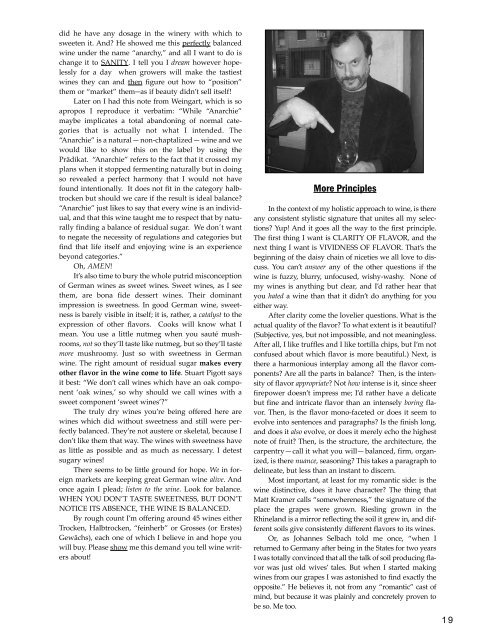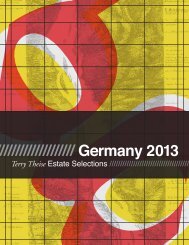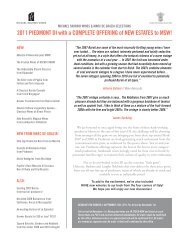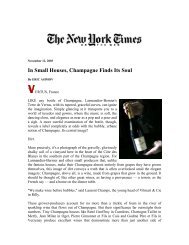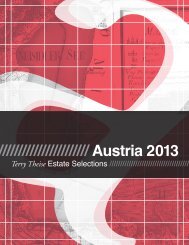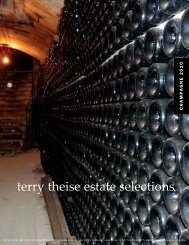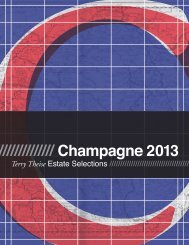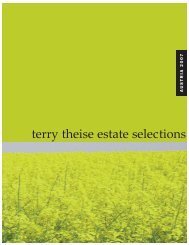German Catalog 2006 USE THIS ONE.qxp - Michael Skurnik Wines
German Catalog 2006 USE THIS ONE.qxp - Michael Skurnik Wines
German Catalog 2006 USE THIS ONE.qxp - Michael Skurnik Wines
You also want an ePaper? Increase the reach of your titles
YUMPU automatically turns print PDFs into web optimized ePapers that Google loves.
did he have any dosage in the winery with which to<br />
sweeten it. And? He showed me this perfectly balanced<br />
wine under the name “anarchy,” and all I want to do is<br />
change it to SANITY. I tell you I dream however hopelessly<br />
for a day when growers will make the tastiest<br />
wines they can and then figure out how to “position”<br />
them or “market” them—as if beauty didn’t sell itself!<br />
Later on I had this note from Weingart, which is so<br />
apropos I reproduce it verbatim: “While “Anarchie”<br />
maybe implicates a total abandoning of normal categories<br />
that is actually not what I intended. The<br />
“Anarchie” is a natural — non-chaptalized — wine and we<br />
would like to show this on the label by using the<br />
Prädikat. “Anarchie” refers to the fact that it crossed my<br />
plans when it stopped fermenting naturally but in doing<br />
so revealed a perfect harmony that I would not have<br />
found intentionally. It does not fit in the category halbtrocken<br />
but should we care if the result is ideal balance?<br />
“Anarchie” just likes to say that every wine is an individual,<br />
and that this wine taught me to respect that by naturally<br />
finding a balance of residual sugar. We don´t want<br />
to negate the necessity of regulations and categories but<br />
find that life itself and enjoying wine is an experience<br />
beyond categories.”<br />
Oh, AMEN!<br />
It’s also time to bury the whole putrid misconception<br />
of <strong>German</strong> wines as sweet wines. Sweet wines, as I see<br />
them, are bona fide dessert wines. Their dominant<br />
impression is sweetness. In good <strong>German</strong> wine, sweetness<br />
is barely visible in itself; it is, rather, a catalyst to the<br />
expression of other flavors. Cooks will know what I<br />
mean. You use a little nutmeg when you sauté mushrooms,<br />
not so they’ll taste like nutmeg, but so they’ll taste<br />
more mushroomy. Just so with sweetness in <strong>German</strong><br />
wine. The right amount of residual sugar makes every<br />
other flavor in the wine come to life. Stuart Pigott says<br />
it best: “We don’t call wines which have an oak component<br />
‘oak wines,’ so why should we call wines with a<br />
sweet component ‘sweet wines’?”<br />
The truly dry wines you’re being offered here are<br />
wines which did without sweetness and still were perfectly<br />
balanced. They’re not austere or skeletal, because I<br />
don’t like them that way. The wines with sweetness have<br />
as little as possible and as much as necessary. I detest<br />
sugary wines!<br />
There seems to be little ground for hope. We in foreign<br />
markets are keeping great <strong>German</strong> wine alive. And<br />
once again I plead; listen to the wine. Look for balance.<br />
WHEN YOU DON’T TASTE SWEETNESS, BUT DON’T<br />
NOTICE ITS ABSENCE, THE WINE IS BALANCED.<br />
By rough count I’m offering around 45 wines either<br />
Trocken, Halbtrocken, “feinherb” or Grosses (or Erstes)<br />
Gewächs), each one of which I believe in and hope you<br />
will buy. Please show me this demand you tell wine writers<br />
about!<br />
More Principles<br />
In the context of my holistic approach to wine, is there<br />
any consistent stylistic signature that unites all my selections?<br />
Yup! And it goes all the way to the first principle.<br />
The first thing I want is CLARITY OF FLAVOR, and the<br />
next thing I want is VIVIDNESS OF FLAVOR. That’s the<br />
beginning of the daisy chain of niceties we all love to discuss.<br />
You can’t answer any of the other questions if the<br />
wine is fuzzy, blurry, unfocused, wishy-washy. None of<br />
my wines is anything but clear, and I’d rather hear that<br />
you hated a wine than that it didn’t do anything for you<br />
either way.<br />
After clarity come the lovelier questions. What is the<br />
actual quality of the flavor? To what extent is it beautiful?<br />
(Subjective, yes, but not impossible, and not meaningless.<br />
After all, I like truffles and I like tortilla chips, but I’m not<br />
confused about which flavor is more beautiful.) Next, is<br />
there a harmonious interplay among all the flavor components?<br />
Are all the parts in balance? Then, is the intensity<br />
of flavor appropriate? Not how intense is it, since sheer<br />
firepower doesn’t impress me; I’d rather have a delicate<br />
but fine and intricate flavor than an intensely boring flavor.<br />
Then, is the flavor mono-faceted or does it seem to<br />
evolve into sentences and paragraphs? Is the finish long,<br />
and does it also evolve, or does it merely echo the highest<br />
note of fruit? Then, is the structure, the architecture, the<br />
carpentry—call it what you will—balanced, firm, organized,<br />
is there nuance, seasoning? This takes a paragraph to<br />
delineate, but less than an instant to discern.<br />
Most important, at least for my romantic side: is the<br />
wine distinctive, does it have character? The thing that<br />
Matt Kramer calls “somewhereness,” the signature of the<br />
place the grapes were grown. Riesling grown in the<br />
Rhineland is a mirror reflecting the soil it grew in, and different<br />
soils give consistently different flavors to its wines.<br />
Or, as Johannes Selbach told me once, “when I<br />
returned to <strong>German</strong>y after being in the States for two years<br />
I was totally convinced that all the talk of soil producing flavor<br />
was just old wives’ tales. But when I started making<br />
wines from our grapes I was astonished to find exactly the<br />
opposite.” He believes it, not from any “romantic” cast of<br />
mind, but because it was plainly and concretely proven to<br />
be so. Me too.<br />
19


